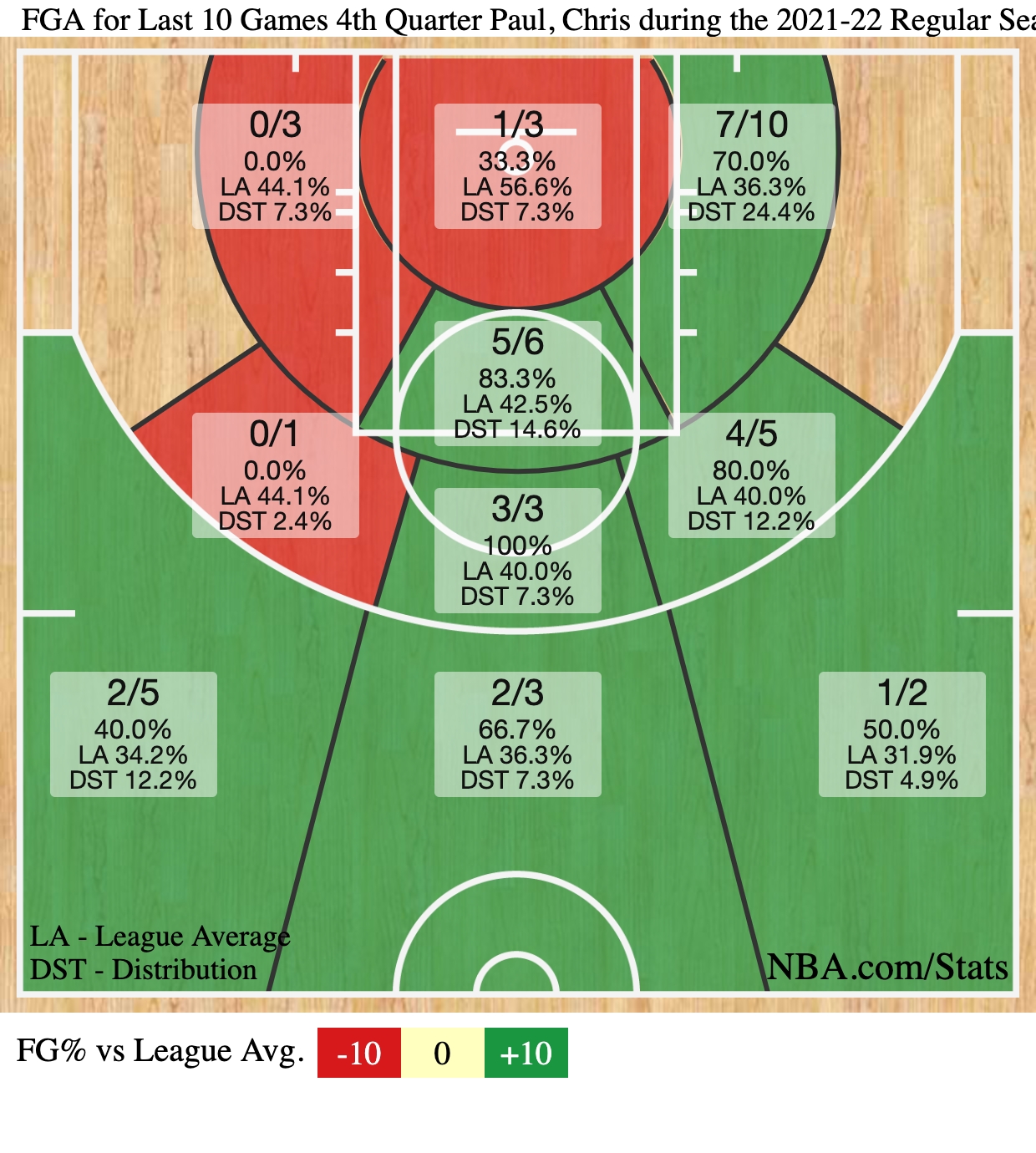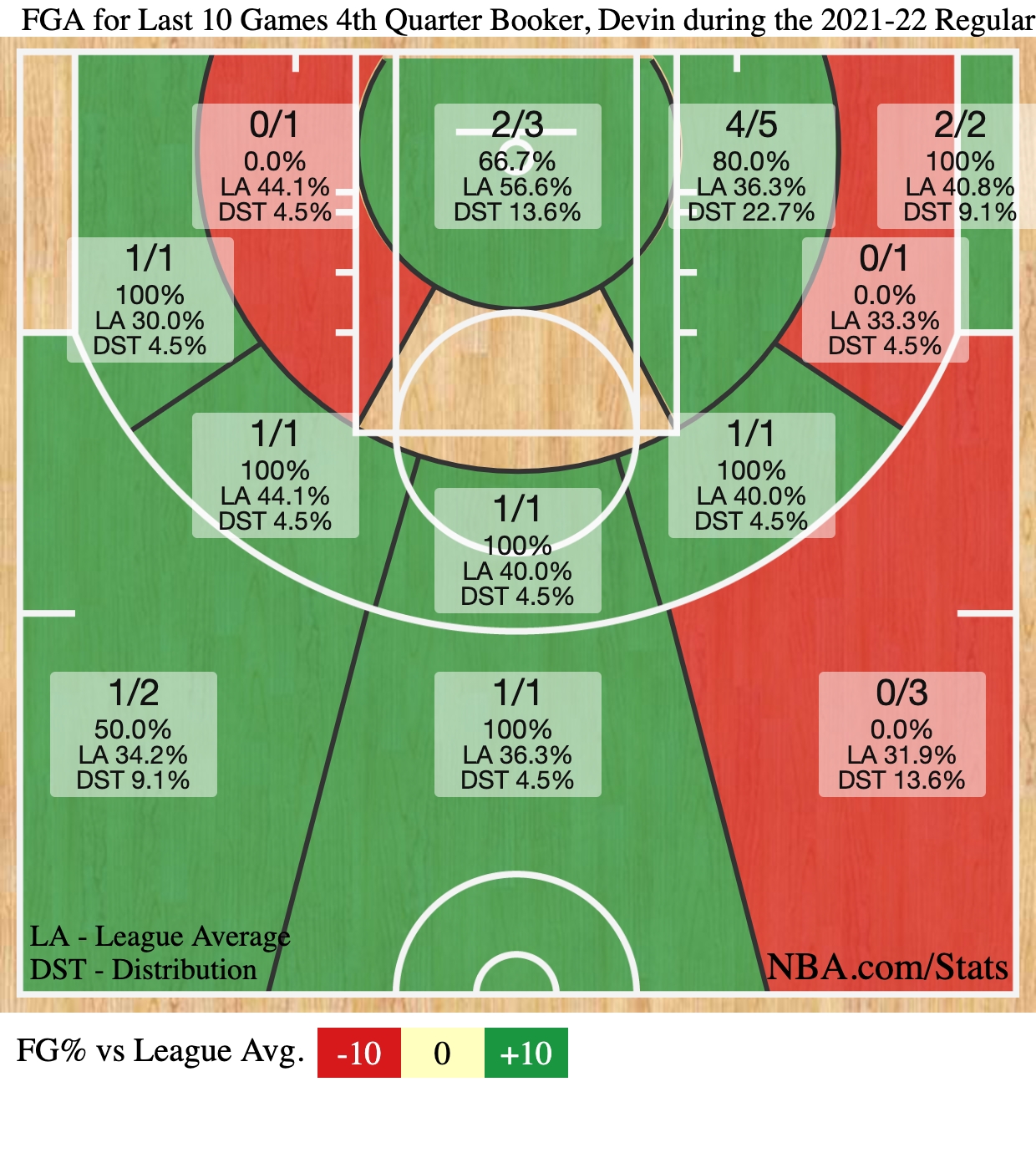The Phoenix Suns are once again seated near the top of the Western Conference standings, 1.5 games behind the red-hot Warriors for the top spot, a familiar place for last year’s 2-seed that made its way to the NBA Finals.
After stumbling out of the gates, the Suns have won 10 straight games, most recently a 105-98 win over the Mavericks on ESPN which highlighted the calm and confidence of this Phoenix team. The pressure of being the reigning West champs seems to have rolled off the Suns backs after that shaky start and they are once again drawing teams out into the deep waters of close fourth quarters and daring them to out-execute their star-studded backcourt in the minutes that matter the most. For the last 10 games, no one has been able to meet that challenge.
Over this winning streak, the Suns are carving up opponents in the final period, boasting a fourth quarter offensive rating of 121.1. When funneled into what the NBA defines as “clutch” moments — a five point game inside five minutes — the Suns are scoring at an absurd clip, with an ORtg of 139.2 in 22 minutes of “clutch” ball this season. The Suns have mastered the art of in-game pacing better than anyone, led by the rope-a-dope stylings of Chris Paul.
No one plays possum better than the 36-year-old Point God, who eases his way through the first three quarters before taking over in the fourth. During the team’s 10 game win streak, Paul is averaging 7.3 points and 3.3 assists in the fourth quarter, logging 9.8 minutes per, by far the most of anyone on the Suns. Considering he is averaging just 15 points per game (and 10.4 assists) during the winning streak, Paul is scoring nearly half of his points each game in the fourth, and it’s no secret where he’s going.

Chris Paul doesn’t go to the rim anymore. Like, ever. He has six total rim attempts in the last 10 games. Everyone knows he’s going to come from the left side of the floor, get a screen from the right, and then pull-up from the midrange, but within that area he has enough shot versatility that he’s still impossible to defend. His preferred spot is the right elbow, but sometimes he’ll stop in the middle of the floor and raise up or fade out closer to the three-point line on the right wing, or run past the elbow to the right baseline for a falling leaner. Where he goes is dictated by what the defense tries to take away, but the result is almost always the same in the fourth quarter — he’s 19-for-24 in those areas during the winning streak.
Classic CP3. pic.twitter.com/c14eVpnsGf
— Phoenix Suns (@Suns) November 18, 2021
If the game isn’t in doubt, Paul will use the screen to get a switch and then have a little fun with opposing bigs in isolation — because sometimes he just wants to be mean, as poor Usman Garuba found out the hard way.
POINT GOD THROUGH THE LEGS 😳 pic.twitter.com/Qbk2BdLd9l
— Phoenix Suns (@Suns) November 15, 2021
Alongside Paul, ready to take control whenever asked is Devin Booker, who feasts for the first three quarters of action while Paul directs traffic before ceding the reins to the future Hall of Famer. Make no mistake, Booker is just as capable and lethal in the final quarter, but often sits to open the proceedings while Paul gets things going before coming in and offering shotmaking reinforcements.
Booker is averaging just 5.5 minutes per fourth quarter during the winning streak, aided by a few blowouts and the luxury of being able to watch Paul take a lead and extend it while he rests. But he too has his fair share of takeovers, averaging 4.6 points in those 5.5 minutes of action in the fourth, lighting up opponents at a 63.6 percent shooting clip from the field.
Like Paul, Booker wants to work from left to right, and his fourth quarter shot chart is eerily similar.

The Suns have a very simple fourth quarter formula, as they put the ball in the hands of two of the best shotmakers in the league over and over again and beg the question of the opponent: can you do it better? It’s what got them to the Finals a year ago, as up until they met Giannis Antetokounmpo and Khris Middleton, they couldn’t find a team that had the right answer.
The barrage of fading midrange shots from the right side of the floor is demoralizing, as Paul and Booker pour in shot after shot over the outstretched arms of opponents, as even good contests have little impact on a duo shooting a combined 61.9 percent from the field in the fourth (39-of-63).
https://twitter.com/Suns/status/1460450375618613249
The pressure the Suns apply to opponents isn’t limited to the shotmaking of Paul and Booker, as they’ve built a team to amplify their strengths in those big moments. Deandre Ayton and JaVale McGee are both good screeners, aggressive rim runners, and dangerous lob threats, always ready to punish any big who steps too high to take away the elbow.
The addition of Landry Shamet has given the Suns another three-point threat, alongside Cam Johnson and Mikal Bridges, daring opponents to dig down off the line and leave a shooter wide open. Ultimately, in an era where defenses are built to take away the rim first and three-point line second, the Suns are able to apply pressure to those two areas away from the ball, allowing their stars to feast in between on single coverage.
On the other end of the floor, they have the length and athletes to make it hard to go shot-for-shot with them, as Bridges pesters opposing stars while Ayton and/or McGee patrol the paint. Their 109.1 DRtg in the fourth quarter puts them 17th in the league over their winning streak, but when you boast the best offense in the fourth quarter, league average will do the trick. The Suns winning streak isn’t so quiet anymore — not with seemingly every talking now head bringing up how no one is talking about the Suns — but what’s most impressive is how familiar it feels.
As many teams are learning this season, it’s hard to simply replicate past success. Opponents adapt, players go through ups and downs, and finding consistency from game to game, much less year to year, can be maddeningly difficult. The Suns, though, have a simple formula and two stars, one young and one old, who know how to execute it.
The winning streak won’t last forever, but in the long run, they’ll continue bank on there not being many teams, if any at all, that can run a better offense when things get tight in the fourth quarter.







